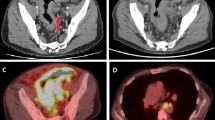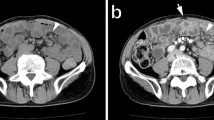Abstract
We describe a case of adult T-cell leukemia (ATL) with intestinal infiltration. In the early clinical stage, the endoscopic findings for the intestine were similar to those of amebic enterocolitis, i.e., varioliform mucosal polypoid lesions, and amebic cyst was detected with stool examination. Although no specific pathological factor could be identified on biopsy, the patient was treated for amebiasis as a diagnostic therapy. the findings of varioliform mucosal polypoid lesions were detected in the duodenum on endoscopic examination, but the lesions eventually disappeared during the treatment for amebiasis. We then suspected lymphoma partially masked by, the amebiasis. Immunological staining of a specimen of the colonic mucosa revealed T cell invasion and Southern blotting demonstrated adult T-cell leukemia provirus invasion. Thus, ATL cell infiltration of the intestinal tract was confirmed It is suggested that systemic disease should also be considered when varioliform mucosal polypoid lesions are found on colonoscopic examination.
Similar content being viewed by others
References
Utsunomiya A, Hanada S, Terada A, et al. Adult T-cell leukemia with leukemia cell infiltration into the gastrointestinal tract. Cancer 1988;61:824–828.
Nakasone T, Masuda M, Arakaki H, et al. Adult T-cell leukemia with massive melena due to marked gastrointestinal involvement (in Japanese). Rinshou Ketsueki (Jpn J Clin Hematol) 1987;30:1848–1852.
Utsunomiya A, Hanada S. Clinical and pathological features of gastrointestinal lesions in patients with adult T cell leukemia (in Japanese with English abstract). Nihon Mounaikei Gakkai Zasshi (Journal of the Japan Society of the Reticuloendotherial System) 1990;30:401–418.
Shimamoto Y, Kikuchi M, Funai N, et al. Spontaneous regression in adult T-cell leukemia/lymhoma. Cancer 1993;72:735–740.
Drobyski WR, Qazi R. Spontaneous regression in non-Hodgkin's lymphoma: Clinical and pathogenetic considerations. Am J Hematol 1988;27:49–55.
Aikou T, Hokita S, Shimazu H. Malignant lymphoma of gastrointestinal tract (in Japanese). Igaku no Ayumi (J Clin Exp Med) 1992;162:78–83.
Yoshida M, Seiki M, Yamaguchi K, et al. Monoclonal integration of human T-cell leukemia provirus in all primary tumors of adult T-cell leukemia suggests causative role of human T-cell leukemia virus in the disease. Proc Natl Acad Sci USA 1984;81:2534–2537.
Hiraoka A, Ikeoka K, Koh Y, et al. A case of adult T-cell leukemia with massive intestinal involvement as chief symptom (in Japanese with English abstract). Rinshou Ketsueki (Jpn J Clin Hematol) 1982;23:1778–1782.
Steven JG, Michael PD, Willandene SZ, et al.Isospora belli enteric infection in patients with human T-cell leukemia virus type I-associated adult T-cell leukemia. Am J Med 1988;85:435–438.
Author information
Authors and Affiliations
Rights and permissions
About this article
Cite this article
Gakiya, I., Kugai, Y., Hayashi, S. et al. Varioliform mucosal polypoid lesions in intestinal tract in a patient with adult T-cell leukemia. J Gastroenterol 32, 553–557 (1997). https://doi.org/10.1007/BF02934099
Received:
Accepted:
Issue Date:
DOI: https://doi.org/10.1007/BF02934099




